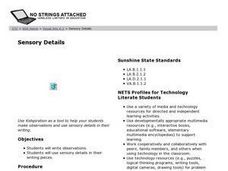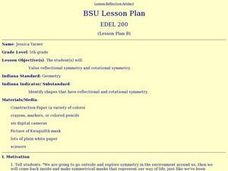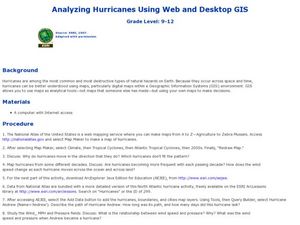Curated OER
Bacterial growth
Students explore the exponential growth and decay of microbial populations in relation to the organism tolerance ranges in their environment, They observe the impact of changing variables which can affect microbial populations.
Curated OER
Sensory Details
Students observe their environment and write detailed, sensory-specific sentences about that environment. This activity can be extended to include the creation of a personalized story or movie of the experience (student examples are...
Curated OER
Global Trek
Students investigate people, places and environments. Using the internet, students gather information about the country and culture that they visit. Students use Classport technology to collaborate and communicate with students on a...
Curated OER
Celebrating Earth Day With Students
Student's attention is focused on the environment during Earth Day. This helps to stimulate their creativity and imagination, so that they can act persuasively to help solve environmental problems.
Curated OER
Ecosystem Interactions in Refuges
Seventh graders, using national parks as models, illustrate the energy flow in ecosystems. Working in groups, they use murals, flow charts, or other visual displays to record their findings. Students represent the food chains and webs...
Curated OER
Bird Up
Third graders identify basic physical and behavioral characteristics of birds and how they adapt to their environments. To organize and share scientific information with peers. They discuss similarities and differences among birds....
Curated OER
Reflectional Symmetry And Rotational Symmetry
Fifth graders study reflectional symmetry and rotational symmetry. They go outside and explore symmetry in the environment. They come back inside and make symmetrical masks that represent their way of life.
Curated OER
Rain Forest Adventures
Students identify and describe where tropical rain forests are located and examine the geographical correlation between rainfall and rain forest. They brainstorm what they think they know about tropical rain forests - where they're...
Curated OER
Reduce, Re-use, Recycle
Learners determine the importance of recycling to reduce waste, to employ trash in useful ways, and to save the environment. They estimate the percentages of landfill waste that items constitute, based on what they found in their own...
Curated OER
Farming Number 6
In this environment worksheet, students identify and explain the importance of water and farming. They identify the differences between food items and whether they are a fruit, vegetable, or animal. Students also respond to 5 yes/no...
Curated OER
Blending Butterflies
Students create camouflage butterflies. In this camouflage lesson plan, students read about the different types of camouflage. Each student in the class chooses a spot in the classroom and creates a camouflaged butterfly. They hang up...
Curated OER
Those Amazing Earthworms- A Worm's World
Students investigate earthworms. In this organisms lesson, students observe earthworms in their environment and record their behavior towards light and how they eat. Students continue on a month long observation.
Curated OER
Dress Like A Frog
Students recognize amphibian adaptations. In this amphibian lesson students explore amphibian adaptations that provide for successful living in their environments. A volunteer dresses up with all of the adaptations using everyday items...
Curated OER
Analyzing Hurricanes Using Web and Desktop GIS
Students analyze hurricanes. In hurricanes lesson, students use the Internet and GIS to analyze hurricanes. Students view the National Atlas of Maps to discuss the direction hurricanes move. Students study the wind and pressure fields to...
Curated OER
I See a Coyote
Students role-play coyotes looking for natural resources. In this natural resources lesson, students examine the relationship between animal life and the environment. Students play a game that demonstrates how natural resources affect...
Curated OER
Brine Shrimp Hatching Experiment
Learners hatch brine shrimp in a classroom experiment. In this hatching brine shrimp lesson, students participate in two-week lab in which they study how brine shrimp hatch under different conditions. They record data about the control...
Curated OER
Animal Adaptations
Students expand their knowledge of animal features and behaviors that can help or hinder their survival in a particular habitat. They participate in classroom discussions and visit a website to research animals
Curated OER
Make a Nature Mobile
Students take nature walks to collect items from the environment such as leaves, shells, branches, feathers, and seeds. Working in groups, they assemble their items into mobiles and display them in the classroom.
Curated OER
How Can We Make Businesses Safe And Effective?
Fourth graders complete several lessons in order to gain an overview of various facets of business. They read books about business, identify business careers that are of interest to them, write letters to local business leaders, listen...
Curated OER
TE Activity: Trash Talkin'
Students collect and categorize solid waste produced in the classroom. They weigh the waste that has been collected over one week's time, and separate it into recyclable and non-recyclable waste. They talk about the role of engineers in...
Curated OER
Interactive Journeys
Learners investigate environments and animals through the use of technology while on class field trips. The lesson is highly adaptable and can work with any field trip in many subject areas.
Curated OER
Shh! We're Writing the Constitution
Fifth graders research, examine and study about the three branches of the government and the contents of the Constitution including both the Articles and the Amendments. They create their own classroom constitution at the end of the unit.
Curated OER
Look At Those Leaves!
Students observe leaves and their attributes and group them accordingly. In this science observation lesson students gather leaves and use them to become more familiar with seasonal changes and the cycles of our environment.
Facing History and Ourselves
How Do Rules and Traditions Shape Communities?
Sixth graders explore the concepts of laws and customs in a community, examining the reasoning behind rules. Then then collaborate to write their own classroom code of conduct.

























